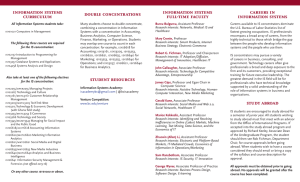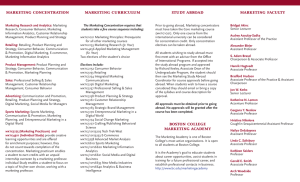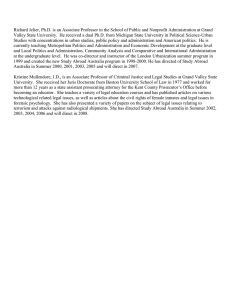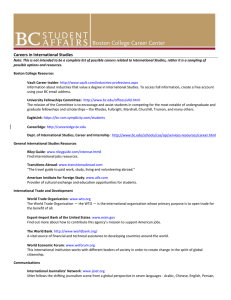careers in information systems full-time faculty curriculum
advertisement
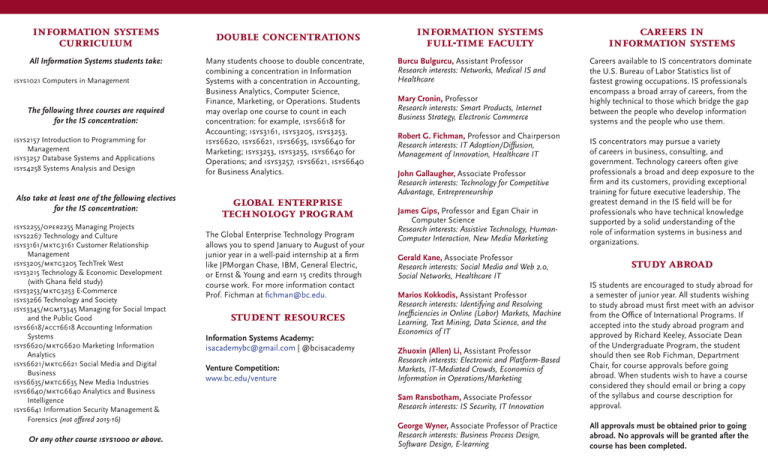
information systems curriculum All Information Systems students take: isys1021 Computers in Management The following three courses are required for the IS concentration: isys2157 Introduction to Programming for Management isys3257 Database Systems and Applications isys4258 Systems Analysis and Design Also take at least one of the following electives for the IS concentration: isys2255/oper2255 Managing Projects isys2267 Technology and Culture isys3161/mktg3161 Customer Relationship Management isys3205/mktg3205 TechTrek West isys3215 Technology & Economic Development (with Ghana field study) isys3253/mktg3253 E-Commerce isys3266 Technology and Society isys3345/mgmt3345 Managing for Social Impact and the Public Good isys6618/acct6618 Accounting Information Systems isys6620/mktg6620 Marketing Information Analytics isys6621/mktg6621 Social Media and Digital Business isys6635/mktg6635 New Media Industries isys6640/mktg6640 Analytics and Business Intelligence isys6641 Information Security Management & Forensics (not offered 2015-16) Or any other course isys1000 or above. double concentrations Many students choose to double concentrate, combining a concentration in Information Systems with a concentration in Accounting, Business Analytics, Computer Science, Finance, Marketing, or Operations. Students may overlap one course to count in each concentration: for example, isys6618 for Accounting; isys3161, isys3205, isys3253, isys6620, isys6621, isys6635, isys6640 for Marketing; isys3253, isys3255, isys6640 for Operations; and isys3257, isys6621, isys6640 for Business Analytics. global enterprise technology program The Global Enterprise Technology Program allows you to spend January to August of your junior year in a well-paid internship at a firm like JPMorgan Chase, IBM, General Electric, or Ernst & Young and earn 15 credits through course work. For more information contact Prof. Fichman at fichman@bc.edu. student resources Information Systems Academy: isacademybc@gmail.com | @bcisacademy Venture Competition: www.bc.edu/venture information systems full-time faculty Burcu Bulgurcu, Assistant Professor Research interests: Networks, Medical IS and Healthcare Mary Cronin, Professor Research interests: Smart Products, Internet Business Strategy, Electronic Commerce Robert G. Fichman, Professor and Chairperson Research interests: IT Adoption/Diffusion, Management of Innovation, Healthcare IT John Gallaugher, Associate Professor Research interests: Technology for Competitive Advantage, Entrepreneurship James Gips, Professor and Egan Chair in Computer Science Research interests: Assistive Technology, HumanComputer Interaction, New Media Marketing Gerald Kane, Associate Professor Research interests: Social Media and Web 2.0, Social Networks, Healthcare IT careers in information systems Careers available to IS concentrators dominate the U.S. Bureau of Labor Statistics list of fastest growing occupations. IS professionals encompass a broad array of careers, from the highly technical to those which bridge the gap between the people who develop information systems and the people who use them. IS concentrators may pursue a variety of careers in business, consulting, and government. Technology careers often give professionals a broad and deep exposure to the firm and its customers, providing exceptional training for future executive leadership. The greatest demand in the IS field will be for professionals who have technical knowledge supported by a solid understanding of the role of information systems in business and organizations. study abroad Sam Ransbotham, Associate Professor Research interests: IS Security, IT Innovation IS students are encouraged to study abroad for a semester of junior year. All students wishing to study abroad must first meet with an advisor from the Office of International Programs. If accepted into the study abroad program and approved by Richard Keeley, Associate Dean of the Undergraduate Program, the student should then see Rob Fichman, Department Chair, for course approvals before going abroad. When students wish to have a course considered they should email or bring a copy of the syllabus and course description for approval. George Wyner, Associate Professor of Practice Research interests: Business Process Design, Software Design, E-learning All approvals must be obtained prior to going abroad. No approvals will be granted after the course has been completed. Marios Kokkodis, Assistant Professor Research interests: Identifying and Resolving Inefficiencies in Online (Labor) Markets, Machine Learning, Text Mining, Data Science, and the Economics of IT Zhuoxin (Allen) Li, Assistant Professor Research interests: Electronic and Platform-Based Markets, IT-Mediated Crowds, Economics of Information in Operations/Marketing concentration in information systems for more information IS means business. Information Systems (IS) is the lifeblood of the modern enterprise, making up the single largest portion of capital spending among US corporations. IS has the power to create and restructure industries, empower individuals and firms, and dramatically reduce costs. Many of the world’s most successful corporations arrived at their position in part due to their effective use of such systems. Organizations desperately need well-trained IS specialists and technology-savvy managers. Today’s manager simply cannot perform effectively without a solid understanding of the role of information systems in organizations, competition, and society. The IS concentration focuses on both technology and its effective use in organizations. The objective of the concentration is to develop managers who: • Understand how to analyze the linkages between IT, innovation, business strategy, and competitive advantage • Possess the technical skills (related to programming and databases) and managerial concepts needed to effectively plan, develop, and implement IT • Understand how to promote more effective use of IT in organizations, taking into account how IT aligns with an organization’s strategic focus, culture, business processes, etc. • Appreciate the broader ethical and societal implications of the burgeoning application of information technologies. The IS concentration is designed for students with an aptitude for logical, analytical thinking and prepares them for entry-level positions in a variety of fast-growing professions. The IS concentration is a strong choice as a primary concentration for Carroll School students. Given the increasing influence of IS in all functional areas, it also serves as an excellent second concentration for students whose primary concentration is in another field such as Accounting, Computer Science, Finance, Marketing, or Operations. Prof. Rob Fichman Chairperson, Information Systems Department Fulton Hall 410A 617-552-0471 fichman@bc.edu information systems department fulton 460 140 commonwealth avenue chestnut hill, massachusetts 02467 (617) 552-2331 | www.bc.edu/is Information Systems Concentration
